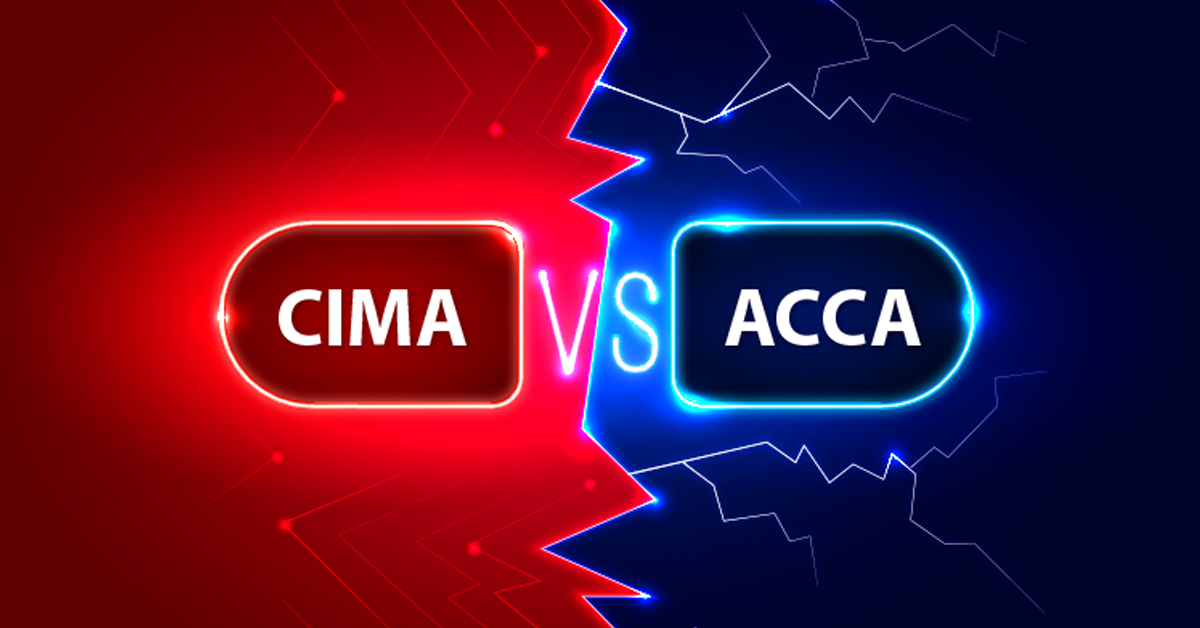Both ACCA and CIMA are reputed certifications in accounting and finance. However, CIMA is little more than just accounting as it also helps in honing decision-making skills because it is a mix of accounting and business management.
Hence, both certification programs cater to specific job profiles, and the candidates need to decide based on their career aspirations.
The ACCA in comparison tends to be more focused on financial accounting and technical practices of accountancy. Industry evidence suggests that the ACCA will give you a stronger grounding in accounting principles than CIMA but at the cost of management reporting and corporate strategy.
In comparison to ACCA, CIMA combines business acumen with financial management, cost management, and financial management.
There is a strong focus on performance management and strategy. CIMA qualification covers more management accounting, more business strategy and more financial strategy material than the ACCA syllabus.
acca institute
ACCA – Association of Chartered Certified Accountants
The ACCA qualification requires 14 examinations to be taken, although a degree in accounting and finance can exempt you from the majority of these. Technical Accounting knowledge is the primary focus of the ACCA syllabus. Subjects covered are financial accounting & management, cost accounting & performance management.
It also gives you an option to specialize in financial reporting, taxation or auditing. ACCA, like the CIMA, also requires three years of practical experience and can be typically completed in 3 – 4 years.
The ACCA qualification will lead to a career as a Chartered Certified Accountant in the corporate sector, public sector or in public accounting/ audit/ consulting practices. ACCA institute can offer you finely crafted ACCA courses with a well-established curriculum and help in successfully pass the exam.
ACCA combines the benefits of traditional accounting skills with a wide-ranging and forward-looking syllabus, which recognizes that financial professionals are increasingly required to demonstrate strategic thinking.
CIMA – Chartered Institute of Management Accountants
Studying for CIMA will involve passing 17 examinations, although exemptions are available to some of these through various entry routes.
Business skills are at the heart of the CIMA qualification, covering business and management accounting subjects, information management, strategy, strategic marketing & management and finance management.
The CIMA qualification combines exams at four stages with three years of practical experience. The qualification typically can be completed in 2 – 2.5 years.
The CIMA qualification will further lead to a global qualification Chartered Global Management Accountant – CGMA by AICPA.
As a Chartered Management Accountant, future roles can be found in managerial positions in both public and private sector organizations worldwide as the qualification is accepted in over 170 countries.
CIMA-qualified applicants will typically choose careers within the industry in forwarding thinking and strategy based roles.
STATISTICS BETWEEN ACCA AND CIMA
The ACCA in comparison tends to be more focused on financial accounting and technical practices of accountancy. Industry evidence suggests that the ACCA will give you a stronger grounding in accounting principles than CIMA but at the cost of management reporting and corporate strategy.
In comparison to ACCA, CIMA combines business acumen with financial management, cost management, and financial management.
There is a strong focus on performance management and strategy. CIMA qualification covers more management accounting, more business strategy and more financial strategy material than the ACCA syllabus.
CIMA focuses on the management and strategic aspects of a business, whereas ACCA focuses more on the technical side, such as auditing and tax accounting.
CIMA works together with the company’s management, whereas ACCA usually deals with external parties, such as shareholders and potential investors.
THE BEST?
CIMA vs ACCA are both international qualifications that are globally accepted and highly regarded qualifications in Finance and Accounting.
The right choice between these qualifications can only be arrived at based on personal career aspirations and fit for job profiles.
The CIMA would be recommended for graduates looking for a career primarily in business and industry with a flair for strategy and commercial awareness and possessing good interpersonal skills.
While the ACCA would be recommended for graduates looking for a career primarily in practice, audit or tax with a flair for numbers and compliance. But ACCA professionals have to face tough competition from Chartered Accountants (India) if they want to work in India.
Neither one of these certifications is better for your career. They are simply different. Chartered accountants perform accounting and auditing services for international companies that primarily use IFRS or some other international accounting standards to report their financial activities to third parties.
CMAS, on the other hand, are internal accountants who manage the operations of a company. They oversee the production processes and many other company operations. It’s not uncommon for the COO or controller of the company to be a CMA.
As you can see, both of these certifications have a much different focus. It all depends on what you want to do with your career.
Can you join both the ACCA and CIMA?
If you are a management accountant (CMA), you may find advantages in joining both ACCA and CIMA. If you feel that ACCA offers benefits that CIMA may be lacking, you may want to join both.
On the other hand, if you practice in the public sector, there would be little need to join CIMA if you already belong to ACCA.
CONCLUSION
If you are a management accountant (CMA), you may find advantages in joining both ACCA and CIMA. If you feel that ACCA offers benefits that CIMA may be lacking, you may want to join both.
On the other hand, if you practice in the public sector, there would be little need to join CIMA if you already belong to ACCA.
After completing CIMA the ACCA will allow you to study with them, even if you are self employed doing more than bookkeeping i.e. a partner of an accounting firm or a self employed accountant. By having CIMA, you are now allowed to study ACCA without just doing bookkeeping.

